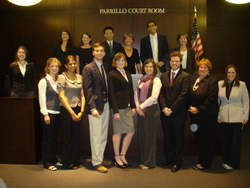
Many Northwestern University Feinberg School of Medicine students choose to enhance their MD education by simultaneously working toward a master’s degree that concentrates on the legal, historical, philosophical, and cultural contexts of medicine. The combined Doctor of Medicine/Master of Arts in Medical Humanities and Bioethics (MD/MA) Program offered by the medical school emphasizes the interdisciplinary study of medicine and bioethics through the humanities and ethics-focused social sciences.
“The master’s program in medical humanities and bioethics promotes the interdisciplinary study of medicine and bioethics through the humanities: philosophy, literature, cultural anthropology, law, religious studies, and history,” says Kathryn Montgomery, PhD, director of graduate studies and professor of medical humanities and bioethics and medicine. “We were one of the first interdisciplinary bioethics MA programs in the United States and our students benefit from faculty members who are nationally renowned.”
The program is designed to work in conjunction with the MD course load and be completed in four years, though students can opt to take five years. The curriculum consists of eight courses, two tutorials, and a thesis.
Alexandra Goodwin, a second year medical student, chose Feinberg because she found a medical education paired with humanities seminars and discussions appealing.
Alexandra Goodwin, a second year medical student, earned her bachelor’s degree in American Studies, but knew that she wanted to pursue a career in medicine. After undergrad, Goodwin taught high school students in New York and Washington, DC. She later completed a post baccalaureate pre-medical program to fulfill basic science prerequisites for medical school.
“Feinberg was my first choice because of the MD/MA program,” Goodwin says. “We have the ability to complete both degrees in four years. I wouldn’t have sought the dual degree had it not been for the manageable time commitment.”
A medical education paired with humanities seminars and discussions appealed to Goodwin after a three-year break from her liberal arts undergraduate studies.
“I can’t imagine not having a base in medical ethics, legal issues, and policy. It enables us to learn the basic sciences with a greater idea of context,” she says.
For MD/MA students, the social sciences become a part of everything they do. Goodwin, for example, plans on pursuing humanities-based research. Last summer she studied the formation of health networks as part of a global health research program in East Africa. Ultimately, Goodwin hopes to specialize in maternal and/or child health care.
“I’m proud to be part of an MD program that integrates humanities education in concert with the basic sciences,” Goodwin says. “I think it will make me a better physician and become a better contributor to the community that I serve.”
For more information on the MD/MA program, please visit their website.






